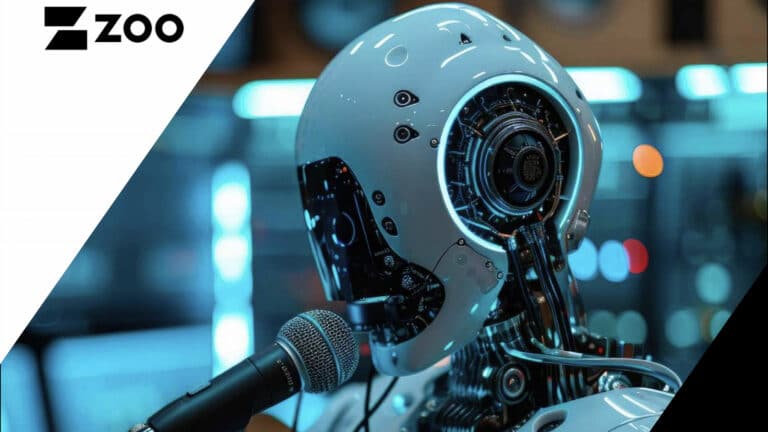ZOO Digital, a leading provider of localisation and media services such as subtitling, translation, dubbing and scripting, has today published a landmark white paper on Artificial Intelligence (AI), giving an insight into how the revolutionary technology is bringing transformation in its market.
The paper examines the fundamental questions of:
- Can AI replace humans?
- What are the benefits for productivity?
- Where do the limitations lie?
- What are the ethical considerations?
It finds that AI is already making strides in the localisation of premium entertainment content by offering tools that assist in improving workflows and enhancing productivity, where its greatest value lies in supporting traditional practices, as opposed to displacement of jobs as is often feared.
AI, Robot: are jobs at risk?
While AI is expected to prompt change in industrial production and replace some jobs as in many industries, this trend is expected to be the same as those of past industrial and information revolutions. For instance, the rise of telecommunication technology led to job shifts from telephonists to new roles like social media managers and app developers.
This is no different when it comes to media localisation. This is because quality and authenticity are key cornerstones for this industry, especially for premium entertainment. Although AI can streamline certain processes, it still requires human oversight. Professional linguists must review translated subtitles, editors ensure captions meet style guides, and directors adjust synthetic speech to guarantee fluency.
The integration of AI into media localisation workflows therefore is most effective when it supports skilled professionals, enhancing quality while reducing turnaround times.
Enhancing Productivity
Some applications of AI are already proving to be beneficial as the software can assist, for example, with initial dialogue transcription, a key step in the localisation process. These transcriptions also aid in creating same-language captions for the deaf and hard-of-hearing. However, the quality standards of premium content providers still require human editors to review and perfect these outputs, ensuring accuracy, authenticity and cultural relevance.
Machine translation is another area where AI shows promise but falls short for premium entertainment content. While automatic subtitling tools may work for cheap to create, user-generated content or factual narrated documentaries, they are inauthentic for entertainment media that requires a nuanced understanding of conversational dialogue. For this reason, skilled human linguists are essential to ensure that subtitles or dubbing scripts accurately reflect the tone, emotion, and intention of the original content.
Limitations
While new technologies are emerging to automate the dubbing process-such as synthetic voices and lip-syncing-these innovations still face significant challenges. The need for creativity in scriptwriting and the ability to capture the subtleties of an actor’s performance means that AI currently cannot meet the high standards expected in premium entertainment.
Ethical considerations also play a critical role, and any automation in dubbing must respect both creative integrity and regulatory guidelines. Crucially, any approach must be framed with ethical and regulatory best practice in mind.
Ethical Considerations
As the industry seeks faster time-to-market for high-quality, localised content, AI solutions are being explored. However, ethical and regulatory best practices must guide their adoption. Within the entertainment industry, the ethical issues fall into two categories: intellectual property rights and transparency of its usage.
ZOO Digital advocates for full transparency with clients and partners where the use of AI is being considered. The complex evolution of AI in media localisation will require companies to collaborate with trusted, forward-thinking partners who are committed to embracing innovation without compromising the quality and authenticity that are essential for audiences to enjoy premium entertainment.
Stuart Green, CEO of ZOO Digital Group, said: “AI falls short when it comes to fully addressing the cultural, social, and regulatory nuances essential for creating authentic and believable localised TV and film content for global markets, with human expertise remaining critical to ensuring the high-quality adaptations required for premium content.
“This is because there is so much more to localisation in entertainment than just translation; it includes adapting content to resonate with the specific cultural contexts of audiences. AI is unable to interpret contextual details vital to understanding a narrative’s subtleties — an area where skilled human professionals remain indispensable.
“However, within the field of media localisation, as an innovator in its market, ZOO has identified opportunities to deploy AI in ways that can drive productivity and scalability by supporting skilled human experts to achieve high levels of accuracy and authenticity as well as shortening the time-to-market of entertainment products.”












